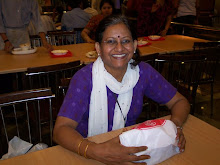Working to engage with the stakeholders of a thematic community, and developing a collective agenda that works as one of the thematic tracks of the eINDIA 2008 conference, the fourth in the series of annual events organised by Centre for Science, Development, and Media Studies was the most enriching experience in the last four-five months of intense preparations.
Now that the conference is over, its time to reflect and look back at the learnings. The opportunity to bring together face to face, at single location, experts and practitioners from all over the country, and also a few guests from outside India (almost 35 countries) provides a space for multiplying the energy and ethos of knowledge sharing, where ideas flow like water in the river, and where no barriers are hard to overcome.
This was the state of affairs at India's largest ICT4D event held in Pragati Maidan from July 29-31, 2008. The way and processes involved in bringing together partners from different verticals, from different academic backgrounds and experiences make it all appear like an easy task. But it was not. The unique strength of the event was that it proved to be a delicate balancing job of bringing the voices of different ecosystem players in a way that make ownership of the event large, and varied but one that was unifying.
The exhibition was also very unique in that it showcased products, institutions, initiatives, services all under one roof.
The best part: over 10,000 foot falls in three days! This was 2.5 times higher than what we had projected. The logistics team led by Vicky Kalra, and supported by Ajit Kumar and Bharti Malhotra, and various other staff of CSDMS and eLets technomedia private limited were worth noting. They made it look like a cakewalk! Kudos to them.
More with pictures when I get around to sorting over 18 DVDs recording the events.
Jaya
-




